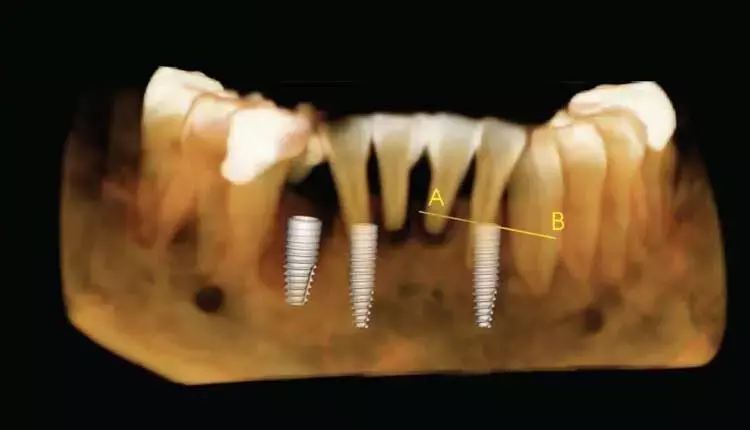- Home
- Medical news & Guidelines
- Anesthesiology
- Cardiology and CTVS
- Critical Care
- Dentistry
- Dermatology
- Diabetes and Endocrinology
- ENT
- Gastroenterology
- Medicine
- Nephrology
- Neurology
- Obstretics-Gynaecology
- Oncology
- Ophthalmology
- Orthopaedics
- Pediatrics-Neonatology
- Psychiatry
- Pulmonology
- Radiology
- Surgery
- Urology
- Laboratory Medicine
- Diet
- Nursing
- Paramedical
- Physiotherapy
- Health news
- Fact Check
- Bone Health Fact Check
- Brain Health Fact Check
- Cancer Related Fact Check
- Child Care Fact Check
- Dental and oral health fact check
- Diabetes and metabolic health fact check
- Diet and Nutrition Fact Check
- Eye and ENT Care Fact Check
- Fitness fact check
- Gut health fact check
- Heart health fact check
- Kidney health fact check
- Medical education fact check
- Men's health fact check
- Respiratory fact check
- Skin and hair care fact check
- Vaccine and Immunization fact check
- Women's health fact check
- AYUSH
- State News
- Andaman and Nicobar Islands
- Andhra Pradesh
- Arunachal Pradesh
- Assam
- Bihar
- Chandigarh
- Chattisgarh
- Dadra and Nagar Haveli
- Daman and Diu
- Delhi
- Goa
- Gujarat
- Haryana
- Himachal Pradesh
- Jammu & Kashmir
- Jharkhand
- Karnataka
- Kerala
- Ladakh
- Lakshadweep
- Madhya Pradesh
- Maharashtra
- Manipur
- Meghalaya
- Mizoram
- Nagaland
- Odisha
- Puducherry
- Punjab
- Rajasthan
- Sikkim
- Tamil Nadu
- Telangana
- Tripura
- Uttar Pradesh
- Uttrakhand
- West Bengal
- Medical Education
- Industry
AI-based segmentation of implants and crowns can improve pre-surgical planning for implants

AI-based segmentation of implants and crowns can improve pre-surgical planning for implants and post-operative assessment of peri-implant bone levels suggests a new study published in the Journal of Dentistry
A study was done to train and validate a cloud-based convolutional neural network (CNN) model for automated segmentation (AS) of dental implant and attached prosthetic crown on cone-beam computed tomography (CBCT) images.
A total dataset of 280 maxillomandibular jawbone CBCT scans was acquired from patients who underwent implant placement with or without coronal restoration. The dataset was randomly divided into three subsets: training set (n = 225), validation set (n = 25) and testing set (n = 30). A CNN model was developed and trained using expert-based semi-automated segmentation (SS) of the implant and attached prosthetic crown as the ground truth. The performance of AS was assessed by comparing with SS and manually corrected automated segmentation referred to as refined-automated segmentation (R-AS). Evaluation metrics included timing, voxel-wise comparison based on confusion matrix and 3D surface differences.
Results
The average time required for AS was 60 times faster (<30 s) than the SS approach. The CNN model was highly effective in segmenting dental implants both with and without coronal restoration, achieving a high dice similarity coefficient score of 0.92±0.02 and 0.91±0.03, respectively. Moreover, the root mean square deviation values were also found to be low (implant only: 0.08±0.09 mm, implant+restoration: 0.11±0.07 mm) when compared with R-AS, implying high AI segmentation accuracy.
The proposed cloud-based deep learning tool demonstrated high performance and time-efficient segmentation of implants on CBCT images.
Clinical significance
AI-based segmentation of implants and prosthetic crowns can minimize the negative impact of artifacts and enhance the generalizability of creating dental virtual models. Furthermore, incorporating the suggested tool into existing CNN models specialized for segmenting anatomical structures can improve pre-surgical planning for implants and post-operative assessment of peri‑implant bone levels.
Reference:
Bahaaeldeen M. Elgarba, Stijn Van Aelst, Abdullah Swaity, Nermin Morgan, Sohaib Shujaat, Reinhilde Jacobs. Deep learning-based segmentation of dental implants on cone-beam computed tomography images: A validation study, Journal of Dentistry, Volume 137,
2023, 104639, ISSN 0300-5712,https://doi.org/10.1016/j.jdent.2023.104639.
Keywords:
AI-based, segmentation, implants, crowns, can, improve, pre-surgical, planning, implants, post-operative, assessment, peri-implant bone levels, Journal of Dentistry, Artificial intelligence; Machine learning; Computer neural networks; Deep learning; Dental implant and cone-beam computed tomography
Dr. Shravani Dali has completed her BDS from Pravara institute of medical sciences, loni. Following which she extensively worked in the healthcare sector for 2+ years. She has been actively involved in writing blogs in field of health and wellness. Currently she is pursuing her Masters of public health-health administration from Tata institute of social sciences. She can be contacted at editorial@medicaldialogues.in.
Dr Kamal Kant Kohli-MBBS, DTCD- a chest specialist with more than 30 years of practice and a flair for writing clinical articles, Dr Kamal Kant Kohli joined Medical Dialogues as a Chief Editor of Medical News. Besides writing articles, as an editor, he proofreads and verifies all the medical content published on Medical Dialogues including those coming from journals, studies,medical conferences,guidelines etc. Email: drkohli@medicaldialogues.in. Contact no. 011-43720751


